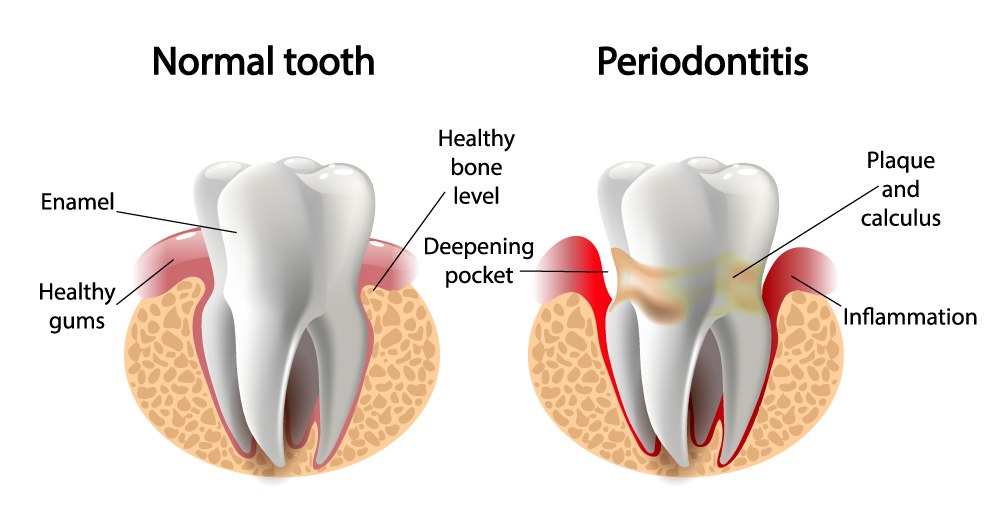The Hidden Connection Between Gum Disease and Stroke


If you haven’t been to the dentist in a while, it might be time to go. According to research conducted in the last 20 years, oral health is related to heart health. Although there is no clear cause and effect relationship between the two, people with poor oral health tend to have poor heart health.
That's not saying that a cardiologist can tell you about your oral health, or that a dentist can tell you about the shape of your heart. But still, since your heart health matters when it comes to stroke prevention, you should be aware of the connection.
Let's have a deeper look at gum disease, and its relationship to strokes.
What is Periodontal Disease?

Periodontal disease, also known as gum disease, is an inflammation of the hard and soft tissues that surround and protect your teeth---in short, your gums.
The most usual cause of gum disease is poor oral hygiene---not brushing your teeth often enough or well enough. Gingivitis is the mildest form of periodontal disease. It causes redness and swelling of the gums, as well as bleeding.
If gingivitis remains untreated, it can turn into periodontitis. Periodontitis is much more severe, and can actually endanger your whole health. The bacteria causing periodontitis make it under the gum line and into your bloodstream. Once in the bloodstream, they start attacking the bones and tissues in the mouth, which makes your gums separate from your teeth. At this point, even more bacteria can reach under the gum line, eventually leading to tooth loss.
The warning signs of periodontitis include:
- Red, swollen or tender gums
- Pain in the mouth
- Bleeding while brushing, flossing, or eating hard foods
- Gums that recede or pull away from the teeth
- Loose teeth
- Pus between the gums and teeth
- Mouth sores
- Persistent bad breath
- A change in your bite (how your teeth fit together when you bite down)
- A change in the fit of partial dentures
The Link Between Periodontal Disease and Heart Health
It might not seem obvious, at first, how gum disease and heart health are related, but it all comes down to inflammation, or the swelling of infected tissues. Inflammation leads to atherosclerosis (hardening of the arteries). Atherosclerosis makes it more difficult for your blood to flow to and from your heart, which then leads to heart disease and stroke.
Research also found that one specific bacteria linked to periodontitis, Streptococcus sanguis, spreads to the heart once it enters the body. This bacterium also plays a role in strokes. With healthy gums, S. sanguis has a harder time entering the body, and thus doesn't spread to the heart.
More research uncovered a relationship between S. sanguis and other periodontal disease bacteria, and the thickness of your carotid (neck) arteries. The more of them you have, the thicker your carotids are, and the harder it is for your blood to flow to your brain---and we know that a lack of blood to the brain is what directly causes strokes.
In short, bacteria that enter through your gums spread to your heart and thicken your arteries, decreasing your cardiovascular health and increasing your chance of stroke.
Another Possible Explanation

While this research provides good explanations for this link, there is a simpler one: people with bad oral health tend to have bad general health. They may be smokers; they may not exercise very much; they may have a poor diet. These things are all related to bad heart health, too. There's also a strong link between diabetes and heart disease.
All these things, as it happens, are also lifestyle risk factors for stroke. Lifestyle factors are the easiest to control and modify. Keeping yourself in good general health is a good way to prevent both heart disease and stroke.
Preventing and Treating Periodontal Disease
The simplest way to prevent gum disease is to brush your teeth at least once a day (but ideally after every meal and once before bed). Brushing removes food debris from your teeth (excellent bacteria food!) and plaque that forms between your gums and your teeth. Bacteria also love hiding on your tongue, so don't forget to scrub it too.
Daily flossing removes food bits and plaque between the teeth and along the gum line that brushes cannot reach. There are several products on the market to make flossing easier.
Good oral health also includes the use of mouthwash. This last step cleans up any remaining plaque or food that you might have missed with brush or floss, and gives you a pleasant breath.
There are also risk factors for periodontal disease, including age, smoking, diet, and genetics. If there is a history of gum disease in your family, you should keep a closer watch on your oral health in general, and your gum health in particular.
You should get a regular gum evaluation by a dentist or periodontist. If necessary, a dental health professional can do something called "scaling and root planing", a procedure that cleans plaque and tartar from your teeth using a manual or ultrasonic scaler.
Good Oral Health, Good General Health
In short, when it comes to your general health, good oral hygiene matters. Brushing and flossing every day is the most effective way to prevent gum disease, but keep a closer eye on your gums if you are pregnant or have a history of stroke, heart disease or type 2 diabetes. Seek treatment if regular brushing and flossing doesn't keep gum inflammation under control.
All content provided on this blog is for informational purposes only and is not intended to be a substitute for professional medical advice, diagnosis, or treatment. Always seek the advice of your physician or other qualified health provider with any questions you may have regarding a medical condition. If you think you may have a medical emergency, call your doctor or 911 immediately. Reliance on any information provided by the Saebo website is solely at your own risk.
All content provided on this blog is for informational purposes only and is not intended to be a substitute for professional medical advice, diagnosis, or treatment. Always seek the advice of your physician or other qualified health providers with any questions you may have regarding a medical condition. If you think you may have a medical emergency, call your doctor or 911 immediately. Reliance on any information provided by the Saebo website is solely at your own risk.



